Question
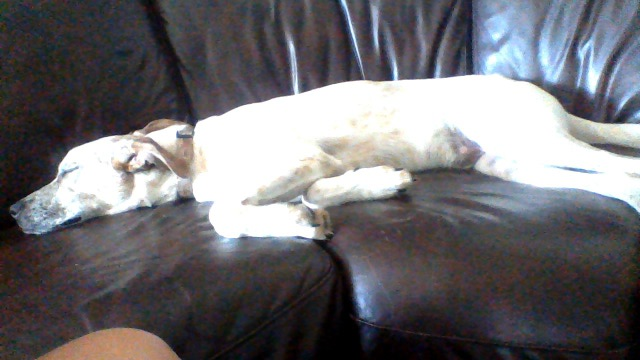 Camo
Camo 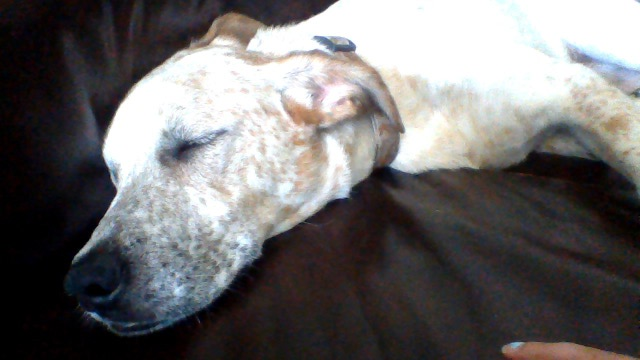 Camo
Camo
Hello, I have a male American Foxhound named Camo. He will be 1 on june 12. He is about 70 lbs, skinny, tall, and lanky.
We have been to the vet for numerous different reasons lately (broken toe, conjunctivitis twice, illness.. etc..)in the past couple of months, so what we are dealing with now doesn't appear to be severe, just curious at the moment. But I know that I will most likely end up going to my vet in the next couple of weeks anyway.
I was playing with Camo and my two other dogs, 8 year old German Shepherd, 12 year old Rottweiler, and we were playing fetch. He is much faster than my other dogs, has much longer legs, and usually much more energy. I play with my dogs every day and this was the first time that I ever saw Camo get worn out before them. He would lay down after only running back and fourth twice. Then we went back inside and he ran to the backyard and jumped the fence when I wasn't looking and I think was running around with his 2 best friend-neighborhood-dogs. (we keep raising the fence, he always finds a way out)I finally found him and when he came inside I yelled at him and he was kinda in "time-out" on the couch. But now I've been lying next to him for like 20 minutes and he just has his head down, sleeping I think, but breathing really heavily through his nose, like REALLY fast. If his mouth was open, he would be panting.. He tries to slow down sometimes, but it's like his lungs won't let him. His heart isn't beating fast though and he still wants to play and run around, just gets winded easily. He seems to have a lot of heath issues, is this normal? my other two dogs haven't gone to the vet except for annual check ups since they were spayed/neutered as puppies. And yes, Camo is neutered too.
When I got him, he wasn't on a heartworm preventative, and then he kept getting sick and taking new meds, so my vet recommended that we wait for a heart worm test. That was a couple of weeks ago, so it could be that. But he never coughs, he still looks like he has a bit of pink eye too, even after all of the medicine. Would a probiotic help?
I've also heard of laryngeal paralysis or paresis, which could fit...
Thank you so much for your time!
Melissa
Answer"Wait for a heartworm test?" The longer you wait, the greater the chances are that he will get it if he doesn't already have it. We start puppies at 6 weeks of age on heartworm prevention and keep them on it YEAR long. No vet can tell you that it "doesn't matter in the winter" because millions of dogs get heartworms in the winter months. Heartworm disease is VERY serious and can cause a multitude of symptoms.
I would run, not walk, to the nearest vets and have him tested for heartworms right away. I would also have his heart listened to and possibly an xray of his chest.
Dogs one years old shouldn't be experiencing what you are describing unless they A. have heartworms, or B. have an enlarged heart, or C. Are just really, really winded. But it could be just about anything. He could be suffering from low blood sugar as well.
But like you said, why would he be winded at this age? I have seen puppies do this, because they got exhausted, but not a one year old dog.
Also, what do you feed this dog? His immune system doesn't sound very strong so I was curious as to what he eats.
I hope that he doesn't have heartworms Melissa, but you really need to get him tested right away. It only takes ONE mosquito to give him heartworm disease.
Unless you live in the Antarctic where there are very few mosquitoes, he is being exposed daily to them. And in America, in just about every state, that means heartworms for most unprotected dogs.
So please get him tested and his heart listened to as well. Please let me know what you find out.
Some information for you:
http://www.heartwormsociety.org/pet-owner-resources/heartworm.html
How Heartworm Happens: The Life Cycle
First, adult female heartworms release their young, called microfilariae, into an animal's bloodstream. Then, mosquitoes become infected with microfilariae while taking blood meal from the infected animal. During the next 10 to 14 days, the microfilariae mature to the infective larval stage within the mosquito. After that, the mosquito bites another dog, cat or other susceptible animal, and the infective larvae enter through the bite wound. It then takes a little over 6 months for the infective larvae to mature into adult worms. In dogs, the worms may live for up to 7 years. Microfilariae cannot mature into adult heartworms without first passing through a mosquito.
What Are the Signs of Heartworm Disease?
For both dogs and cats, clinical signs of heartworm disease may not be recognized in the early stages, as the number of heartworms in an animal tends to accumulate gradually over a period of months and sometimes years and after repeated mosquito bites.
Recently infected dogs may exhibit no signs of the disease, while heavily infected dogs may eventually show clinical signs, including a mild, persistent cough, reluctance to move or exercise, fatigue after only moderate exercise, reduced appetite and weight loss.
Cats may exhibit clinical signs that are very non-specific, mimicking many other feline diseases. Chronic clinical signs include vomiting, gagging, difficulty or rapid breathing, lethargy and weight loss. Signs associated with the first stage of heartworm disease, when the heartworms enter a blood vessel and are carried to the pulmonary arteries, are often mistaken for feline asthma or allergic bronchitis, when in fact they are actually due to a syndrome newly defined as Heartworm Associated Respiratory Disease (HARD).



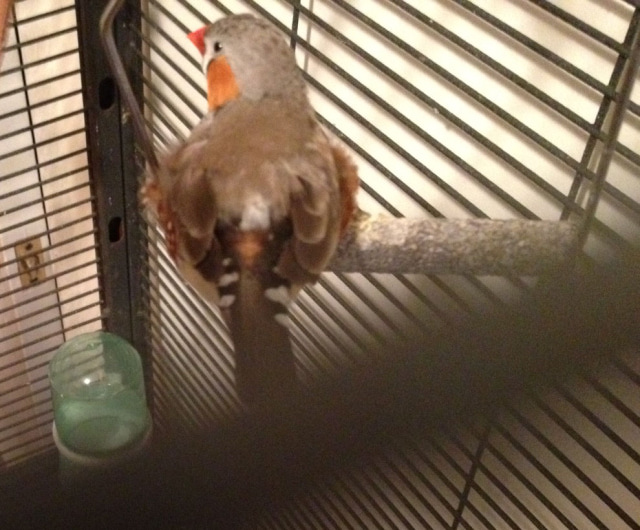 My Finch Had an Incident and Im Not Sure What To Do
Question
Injury Spot on Male Fi
Dear Jana Connel
My Finch Had an Incident and Im Not Sure What To Do
Question
Injury Spot on Male Fi
Dear Jana Connel
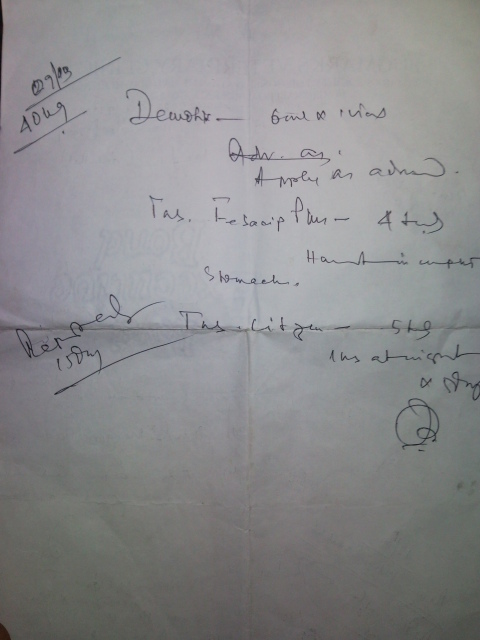 A Major Skin Rash : Please Help
Question
SNC00024.jpg
Sir,
I have a White Female Labra
A Major Skin Rash : Please Help
Question
SNC00024.jpg
Sir,
I have a White Female Labra
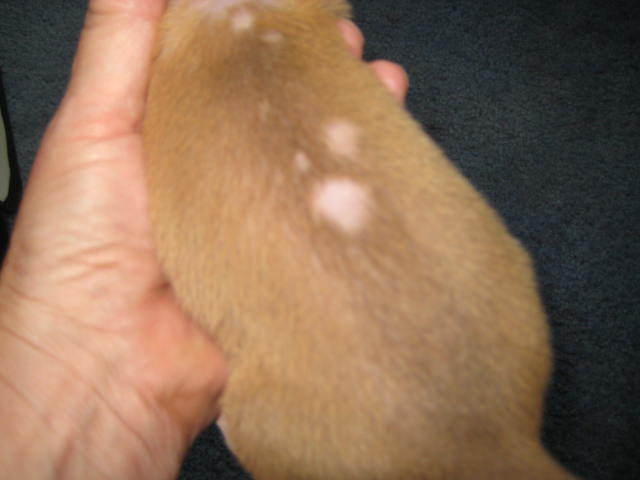 1.6 pound 10 week chihuahua puppy
Questionbald spots forming
QUESTION: Two weeks a
1.6 pound 10 week chihuahua puppy
Questionbald spots forming
QUESTION: Two weeks a
 Heartworm treatment side effects
Question
Charlie
My dog, Charlie, is a 30lb. mut
Heartworm treatment side effects
Question
Charlie
My dog, Charlie, is a 30lb. mut
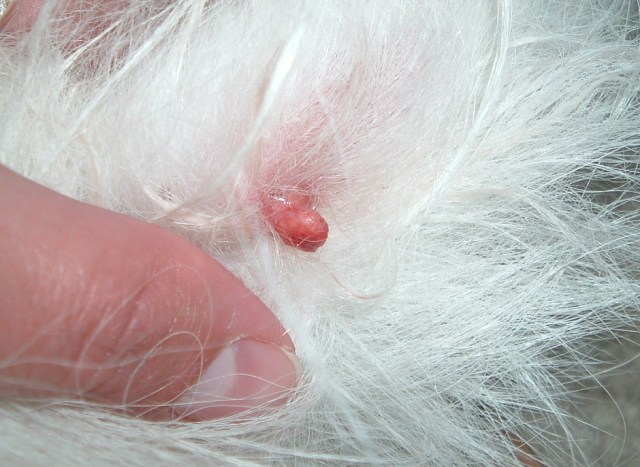 American Eskimo skin growth
Question
Buddy
We have a 9-11 Year old American Eskimo.
American Eskimo skin growth
Question
Buddy
We have a 9-11 Year old American Eskimo.